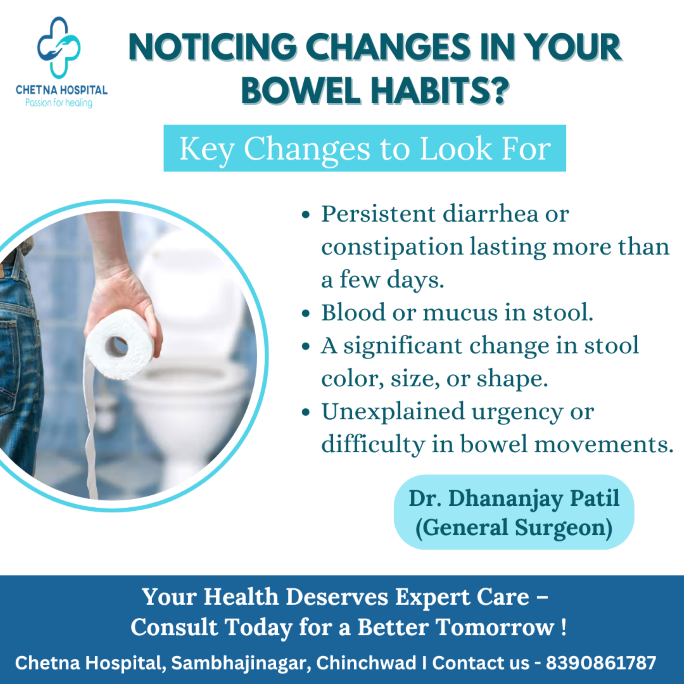Your digestive system plays a crucial role in your overall health. It ensures that your body absorbs essential nutrients and eliminates waste efficiently. However, when bowel habits change suddenly or persist over time, it may signal an underlying health condition that requires attention. Knowing what changes to look for, understanding their potential causes, and seeking medical advice early can make a significant difference in maintaining your well-being.
Understanding Bowel Habits
Bowel habits vary from person to person. What’s normal for one individual may differ for another. Typically, people have bowel movements anywhere from three times a day to three times a week. As long as these habits are consistent and there’s no discomfort, they are generally considered normal.
However, changes in frequency, consistency, color, or appearance of stools should not be ignored, especially when accompanied by other symptoms like pain, bleeding, or weight loss.
Key Changes to Look For
1. Persistent Diarrhea or Constipation
- Diarrhea: Loose, watery stools lasting more than a few days may indicate infections, food intolerances, or conditions like irritable bowel syndrome (IBS). Chronic diarrhea can lead to dehydration and nutrient deficiencies.
- Constipation: Difficulty in passing stools, fewer than three bowel movements per week, or hard, dry stools could signal poor diet, lack of exercise, or more severe issues like bowel obstruction or hypothyroidism.
2. Blood in Stool
- Bright red blood: Often indicates bleeding from the lower gastrointestinal (GI) tract, such as hemorrhoids or anal fissures.
- Dark, tarry stools: May suggest bleeding in the upper GI tract, such as ulcers or stomach lining issues.
Blood in the stool is always a red flag that requires immediate medical evaluation.
3. Changes in Stool Shape or Size
- Narrow or ribbon-like stools: Could be a sign of an obstruction in the colon or a growth restricting stool passage.
- Mucus in stool: While a small amount is normal, excess mucus may indicate inflammation, infections, or conditions like Crohn’s disease.
4. Persistent Abdominal Pain or Cramping
Ongoing discomfort in the abdomen, especially when associated with bowel changes, can be a sign of conditions like IBS, infections, or even colorectal cancer.
5. Unexplained Weight Loss
A sudden drop in weight without changes in diet or activity level may point to serious conditions like malabsorption syndromes, inflammatory bowel diseases (IBD), or malignancies.
Common Causes of Bowel Habit Changes
Dietary Factors
- Low fiber intake or excessive consumption of processed foods can lead to constipation.
- Spicy foods, alcohol, or caffeine may trigger diarrhea in some individuals.
Infections
Bacterial, viral, or parasitic infections can disrupt bowel habits. Food poisoning, stomach flu, or contaminated water are common culprits.
Stress and Lifestyle
Stress impacts the gut-brain connection, potentially leading to conditions like IBS. Lack of exercise and poor hydration also contribute to irregular bowel movements.
Underlying Medical Conditions
- Irritable Bowel Syndrome (IBS): A functional disorder causing constipation, diarrhea, or both, along with abdominal pain.
- Inflammatory Bowel Diseases (IBD): Includes Crohn’s disease and ulcerative colitis, which involve chronic inflammation of the digestive tract.
- Colorectal Cancer: Changes in bowel habits, along with blood in stool, fatigue, and weight loss, can be warning signs of colorectal cancer.
When to See a Doctor
While occasional changes in bowel habits are common, certain symptoms require medical attention:
- Persistent diarrhea or constipation lasting more than a week
- Blood in the stool or black, tarry stools
- Severe abdominal pain or cramping
- Unexplained weight loss or fatigue
- Persistent changes in stool shape, size, or frequency
Early diagnosis is vital for effective treatment, especially for conditions like colorectal cancer or IBD.
Preventive Measures for Healthy Bowel Habits
1. Adopt a Fiber-Rich Diet
Fiber promotes regular bowel movements and prevents constipation. Include fruits, vegetables, whole grains, and legumes in your meals.
2. Stay Hydrated
Drink plenty of water throughout the day. Adequate hydration softens stool and makes it easier to pass.
3. Exercise Regularly
Physical activity stimulates the digestive system, improving bowel motility. Aim for at least 30 minutes of moderate exercise most days.
4. Manage Stress
Practice relaxation techniques like yoga, meditation, or deep breathing exercises to reduce stress and its impact on your gut.
5. Avoid Trigger Foods
Identify and avoid foods that irritate your digestive system, such as dairy, gluten, or highly processed items.
Diagnostic Tests and Treatments
If you notice persistent changes in your bowel habits, your doctor may recommend diagnostic tests to identify the underlying cause.
Common Tests Include:
- Stool analysis: To check for infections, blood, or other abnormalities.
- Blood tests: To detect anemia or inflammation.
- Colonoscopy: To examine the colon for polyps, tumors, or other issues.
- Imaging tests: Such as X-rays, CT scans, or ultrasounds, for a detailed view of the digestive tract.
Treatment Options:
Treatment will depend on the diagnosis. It may include dietary modifications, medications, probiotics, or in some cases, surgery.
The Role of Early Detection
Early diagnosis of bowel-related issues can prevent complications and improve outcomes. For example, colorectal cancer detected at an early stage has a much higher survival rate compared to advanced stages.
Why Choose Chetna Multispeciality Hospital?
At Chetna Multispeciality Hospital, we prioritize your digestive health with:
- Expert doctors specializing in gastroenterology and general surgery
- Advanced diagnostic tools like colonoscopy and imaging tests
- Comprehensive care tailored to your needs
Our dedicated team ensures you receive prompt, compassionate care, helping you get back to your healthiest self.
Conclusion
Changes in bowel habits can be concerning, but they are often manageable with early detection and proper care. Paying attention to your body’s signals and seeking medical advice promptly can prevent minor issues from becoming serious problems.
Take charge of your health today. If you’ve noticed changes in your bowel habits, schedule a consultation with the experts at Chetna Multispeciality Hospital. Together, we’ll ensure your digestive health is in top shape.
For Consultation Contact us on 8390861787
Website – www.chetnahospital.co.in
Address – Chetna Hospital, Sambhajinagar, MIDC, G Block, Near Rotary Club, Chinchwad 411019
.
.
.
#pune#pcmc#chinchwad#hospital#medical#medicalservices#health#healthcare#surgery#generalsurgery#medicalprocedure#generalsurgeon#generalsurgeoninchinchwad













